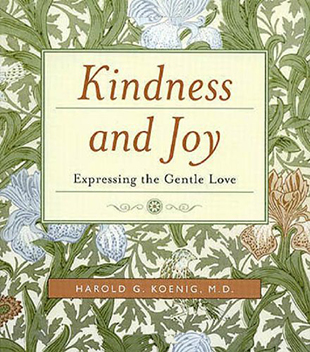In our pragmatic and aggressively competitive culture, kindness is sometimes viewed as one of those effete virtues lacking in charisma or clout. Yet His Holiness the Dalai Lama has said, "Whether one believes in religion or not, there isn't anyone who doesn't appreciate kindness." In this brief but worthwhile paperback, Harold Koenig, founder and co-director of Duke's Center for Spirituality, Theology, and Health, presents a succinct overview of kindness as "the gentle love."
The challenge, Koenig writes, is putting kindness into practice amidst the rigors and complexities of everyday life:
"In this society, everyone is intensely independent. We rely on ourselves, not on others. We don't like having others do things for us. We don't like having to depend on anyone. Kindness runs counter to this obsessive need for self-sufficiency when others offer help. We can be kind to others by allowing them to be kind to us and by showing deep gratitude in return."
Koenig observes that cruelty and rudeness are on the rise and are definitely the opposite of putting others first and treating them with respect. He also sees neglect as a moral affront to the practice of kindness:
"Perhaps less obvious than either cruelty or rudeness — but no less serious — is neglect. Neglect involves ignoring other people's needs despite being able to do something about them. Neglect does not intend to harm the other person and may not even involve contact with the other person. Nevertheless, one person has the power to meet a need, knows about the need, and decides that meeting that need is not worth time and attention. This involves a devaluation of the other person and his or her needs. For example, people are dying of starvation in Africa or a major hurricane has left thousands of people homeless, and I could do something about it, but . . . (followed by a litany or excuses and justifications.) Neglect (or indifference) is much more widespread than either rudeness or cruelty, so it may in fact fit even better as a descriptor of the opposite of kindness. When he was Secretary General of the United Nations, Dag Hammarskjold said, 'Indifference to evil is worse than evil itself, and in a free society, some are guilty, but all are responsible.' "
Koenig points out that the apostle Paul numbered kindness as among the fruits of the Holy Spirit. He sees joy as a sacred emotion that grows out of this practice. After describing some nettlesome barriers to kindness, he goes on to chapters on kindness to strangers and friends, to co-workers, to family; he also covers helping others experience kindness. Koenig concludes:
"Kindness is a gentle form of love. When kind to others, we demonstrate the very best of what it means to be human. It takes practice, persistence, patience, and wisdom, and seldom comes without a price. But it has a big payoff. It is truly a full life that kind and caring people live. Kindness nourishes the mind, the body, and the spirit of both the giver and the receiver. It is an opportunity to act in a way that is essentially and ultimately Divine."
